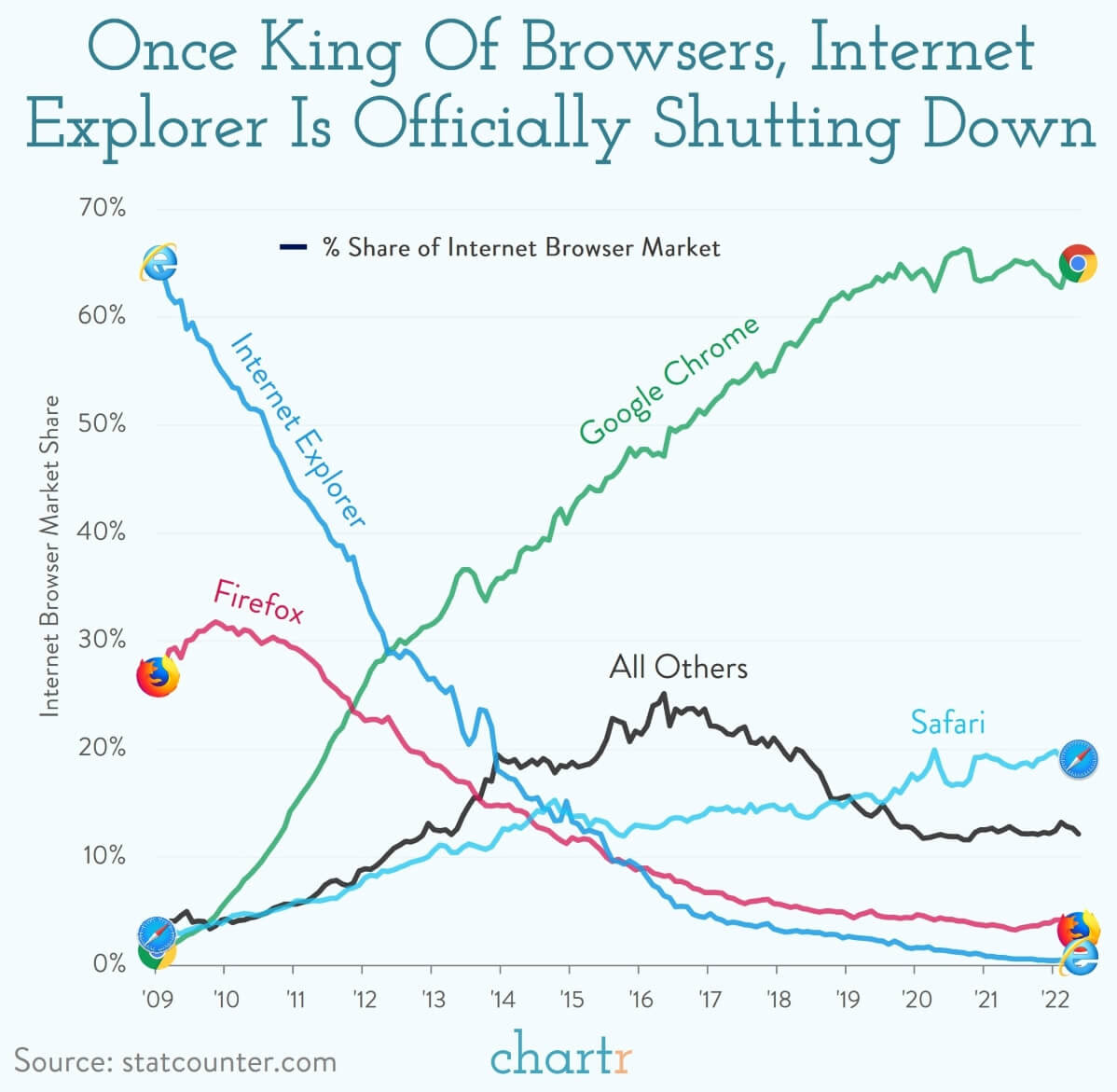On Saturdays we catch up with the non-finance related items that we didn’t get to earlier in the week. You can check out last week’s edition here. Have a great weekend!
Quote of the Day
"Can we expect to have a fresh and energized trading psychology when our bodies are sitting inertly for hours at a time, staring at screens?"
(Brett Steenbarger)
Chart of the Day

Microsoft ($MSFT) Internet Explorer once dominated the internet. Now its gone.
EVs
- Range anxiety isn't going away, even if we spend more money. (msn.com)
- Under pressure, Tesla ($TSLA) is opening its charging network to non-Tesla owners. (politico.com)
- EVs are on their way to becoming boring. Which is a good thing. (theatlantic.com)
Energy
- The Yellowstone supervolcano is a untapped energy source. (marginalrevolution.com)
- How droughts put hydropower projects at-risk. (slate.com)
- Just how good were Exxon's ($XOM) climate change models? (grist.org)
- Why cargo ships are bringing back sails. (fastcompany.com)
Environment
- How the IRA jump started the climate finance industry. (semafor.com)
- What the NOAA is doing to study solar geoengineering. (science.org)
- Plants are rushing up the slopes of North American mountains. (newscientist.com)
Science
- There is no reliable earthquake prediction system. (npr.org)
- Do massive black holes explain the mystery of dark energy? (kottke.org)
- Five insights from "Jellyfish Age Backwards: Nature’s Secrets to Longevity" by Nicklas Brendbord. (nextbigideaclub.com)
Attachment style
Behavior
- Data brokers are coming for mental health data. (washingtonpost.com)
- Depression risk increases after experiencing a stroke. (thedailybeast.com)
- Not every one reacts well to ketamine treatment for depression. (washingtonpost.com)
Health
- Four things to do when you turn 50, including getting a colonoscopy. (theconversation.com)
- Add a new dangerous drug, xlyazine, into the mix of the overdose crisis. (wsj.com)
- Five insights from "How Medicine Works and When It Doesn’t: Learning Who To Trust to Get and Stay Healthy" by Dr. F. Perry Wilson. (nextbigideaclub.com)
- Surprise ambulance bills are depressingly common. (statnews.com)
- At least in mice, a fast-acting sperm inhibitor seems to work. (newatlas.com)
- Let teenagers sleep in. (scientificamerican.com)
Covid
- The emergency phase of the Covid pandemic may be over but we still have long Covid. (msn.com)
- Wastewater data show just how prevalent Covid is these days. (bloomberg.com)
- Covid vaccines have now been added to the immunization schedule. (newscientist.com)
- People undervalue the benefit of the Covid vaccine. (papers.ssrn.com)
- On the brain science of long Covid. (statnews.com)
Food
- Amazon ($AMZN) isn't giving up grocery stores just yet. (ft.com)
- There is a problem with how coffee beans are raised. (thecooldown.com)
- Candles are getting a food-related makeover. (nytimes.com)
Media
- Why Netflix ($NFLX) is laser-focused on sports documentaries, not live sports. (nytimes.com)
- On the state of the radio business in the U.S. (pewresearch.org)
- Why people cancel their streaming subscriptions. (variety.com)
Sports
- Private equity is pushing deeper into pro sports. (institutionalinvestor.com)
- CTE is not just an issue for football players. (newyorker.com)
- The Ironman World Championship is diversifying away from Kona. (nytimes.com)
Earlier on Abnormal Returns
- What you missed in our Friday linkfest. (abnormalreturns.com)
- Podcast links: a new conservatism. (abnormalreturns.com)
- Congrats to Ben on ten years of 'A Wealth of Common Sense.' (abnormalreturns.com)
- Are you a financial adviser looking for some out-of-the-box thinking? Then check out our weekly e-mail newsletter. (newsletter.abnormalreturns.com)
Mixed media
- Smartphones aren't just to blame for breaking work-life balance, you can also thank laptops. (theatlantic.com)
- Five insights from "The Aftermath: The Last Days of the Baby Boom and the Future of Power in America" by Philip Bump. (nextbigideaclub.com)
- Why Gen Z is less interested in driving. (washingtonpost.com)








